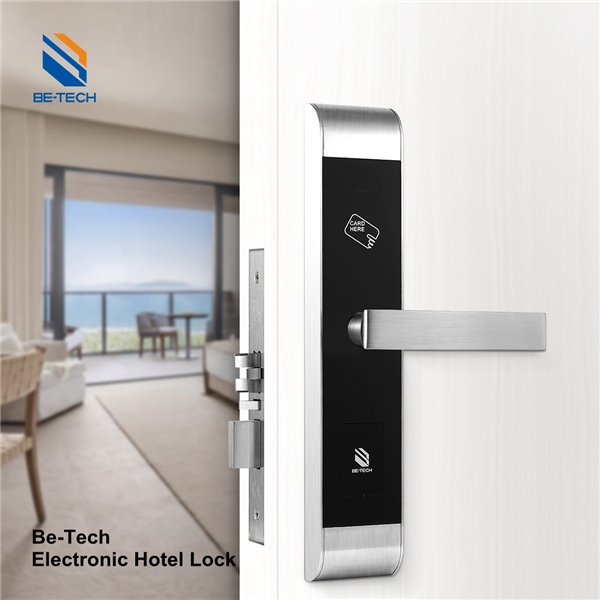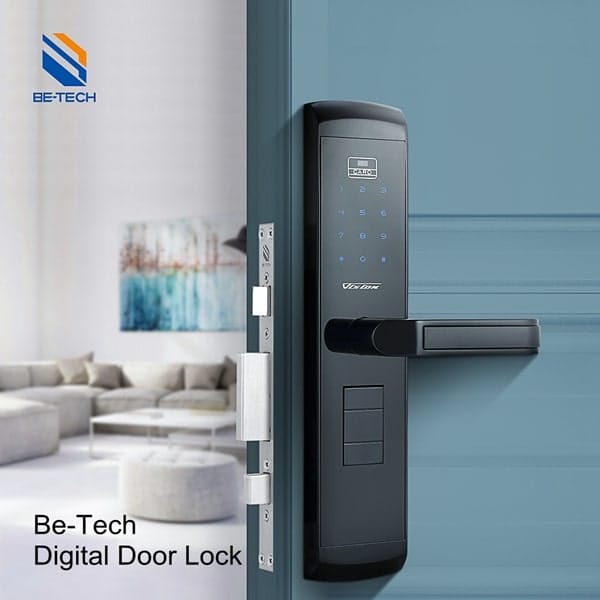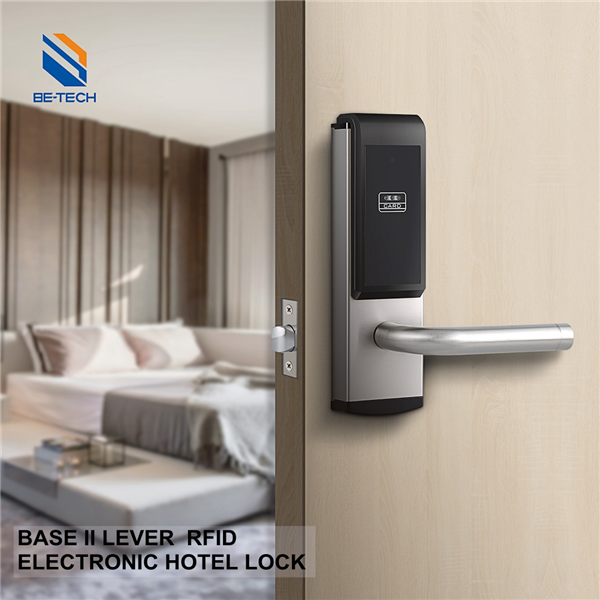In the rapidly evolving hospitality security landscape, selecting the right access control technology has become a critical decision for property managers. This comprehensive analysis examines the three dominant technologies-RFID, mobile access, and biometric systems-through the lens of security compliance, operational efficiency, and guest experience.
Understanding Modern Access Control Technologies
RFID Technology: The Industry Standard
Radio-Frequency Identification (RFID) technology remains the backbone of modern hotel security systems in 2025. Operating on the 13.56MHz frequency (ISO 14443A standard), RFID locks utilize electromagnetic fields to automatically identify and track tags attached to keycards.
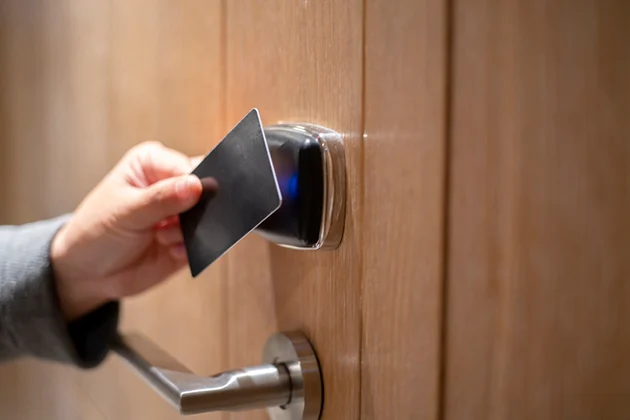
Be-Tech’s GUARDIAN RFID G0 Series exemplifies how RFID technology has evolved to address specific hospitality challenges:
- Humidity Resistance: SUS304 stainless steel construction provides protection against coastal and high-humidity environments
- Comprehensive Audit Trails: 414-event logs that synchronize to SQL/Access databases for security monitoring
- Flexible Installation: Available in ANSI, EURO, and AUS mortise versions for 35-80mm door thicknesses
RFID contactless solutions also align with post-pandemic guest preferences for touchless interactions, providing both hygiene benefits and operational convenience.
Mobile Access: The Guest Experience Enhancer
Mobile access technology transforms guests’ smartphones into room keys using Bluetooth Low Energy (BLE) or Near Field Communication (NFC) protocols. This technology has seen significant adoption acceleration between 2022-2025.

The VISUAL Series with TCP/IP Integration from Be-Tech demonstrates how mobile access enhances the guest journey:
- Contactless Check-in: Enables direct-to-room experiences, bypassing front desk interactions
- Multi-credential Support: Compatible with both mobile and traditional RFID credentials
- Personalization Capabilities: Allows hotels to send personalized welcome messages and offers through the mobile key platform
This technology has demonstrated particular appeal among millennial and Gen Z travelers, with 78% reporting preference for mobile check-in options according to hospitality industry research.
Biometric Systems: The Security Maximizer
Biometric authentication systems use unique physical characteristics-most commonly fingerprints in the hospitality context-to verify identity. These systems offer the highest level of security but come with specific implementation considerations.
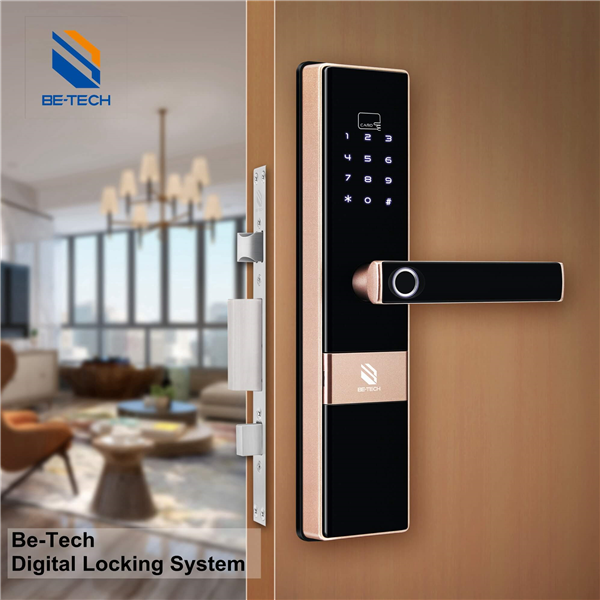
Be-Tech’s H3A5FMTL Fingerprint + RFID Lock represents the hybrid approach gaining traction in luxury properties:
- Multi-authentication Options: Combines fingerprint, RFID card, and touchpad access methods
- False Acceptance Rate: <0.001% (ISO/IEC 19794-2 certified)
- High Security Applications: Particularly valuable for executive floors, VIP suites, and back-of-house areas
Biometric systems show increasing adoption in high-security zones rather than property-wide deployments due to cost and implementation complexity factors.
Technical Comparison and Selection Criteria
Compliance and Security Factors
When evaluating access control technologies for hotel implementation, security directors prioritize several critical factors:
- Encryption Standards: RFID and mobile systems with AES-256 encryption provide robust protection against credential cloning and unauthorized access.
- Audit Trail Capabilities: All three technologies offer audit logging, but mobile and RFID systems typically provide more comprehensive reporting integration.
- Emergency Override Features: Hardware emergency override options remain essential, with 9V battery contacts being standard in quality systems.
The table below compares key security features across technologies:
| Security Feature | RFID | Mobile Access | Biometric |
|---|---|---|---|
| Encryption Level | AES-256 | TLS 1.2 + AES-256 | Device-dependent |
| Credential Cloning Risk | Low (with secure sectors) | Very Low | Extremely Low |
| Audit Trail Capacity | 400-500 events | Unlimited (cloud-based) | 200-300 events |
| Emergency Override | Mechanical cylinder | Mechanical cylinder | Mechanical cylinder |
| Remote Lockdown | Limited | Yes (with proper infrastructure) | Limited |
Installation and Maintenance Considerations
Operational factors significantly impact the total cost of ownership for access control systems:
- Battery Life: Quality RFID locks like the BASE RFID 9004 Series offer 2-3 years of operation with standard 4xAA alkaline batteries.
- Door Preparation Requirements: Retrofitting capabilities vary, with RFID generally requiring minimal modifications to existing doors.
- Firmware Update Process: Mobile-enabled locks typically support over-the-air updates, while others may require physical reprogramming.
Guest Experience Impact
The guest journey has become a central consideration in access technology selection:
- Check-in Time: Mobile solutions reduce check-in times by up to 70% compared to traditional front desk experiences.
- Technology Learning Curve: RFID remains the most intuitive, while biometric systems may require guest education.
- Guest Satisfaction Scores: Mobile key implementations show 15-20% higher satisfaction ratings among tech-savvy guests.
Implementation Strategy and ROI Analysis
Cost Structure Comparison
Understanding the full cost implications helps property managers make informed decisions:
| Cost Component | RFID | Mobile Access | Biometric |
|---|---|---|---|
| Hardware Cost Per Door | $220-280 | $290-350 | $410-550 |
| Installation Labor | 45-60 min/door | 60-90 min/door | 90-120 min/door |
| Infrastructure Requirements | Minimal | WiFi/BLE gateways | Moderate |
| Annual Maintenance | 5-8% of hardware cost | 8-12% of hardware cost | 12-15% of hardware cost |
| Credential Replacement | $2-4 per card | No physical credential | No physical credential |
Return on Investment Factors
ROI calculations should consider both direct and indirect benefits:
- Staff Efficiency: Mobile and RFID solutions reduce key management labor by 25-30%.
- Lost Key Expenses: Electronic solutions eliminate rekeying costs associated with traditional locks.
- Energy Management: Integration with energy management systems can yield 15-20% utility savings.
- Guest Satisfaction Impact: Higher review scores correlate with 5-8% increases in RevPAR.
For a 200-room property, the typical ROI timeline ranges from:
- RFID Systems: 18-24 months
- Mobile Access: 24-30 months
- Biometric Systems: 30-36 months
Property-Specific Implementation Framework
Different property types benefit from tailored deployment strategies:
Boutique Hotels (under 50 rooms):
- Recommended: BASE RFID TYPICAL 75 Series with offline management
- Mobile Consideration: Optional mobile upgrade for properties targeting tech-forward demographics
Mid-scale Properties (50-200 rooms):
- Recommended: VISUAL RFID Aluminium with mobile integration
- Biometric Addition: Consider for executive floors and back-of-house areas
Large Properties & Resorts (200+ rooms):
- Recommended: Full TCP/IP integrated system with mobile access
- Zone-Based Approach: Biometric for high-security areas, mobile/RFID for guest rooms
Future Trends and Technology Evolution
The access control landscape continues to evolve rapidly, with several emerging trends shaping future developments:
- Biometric Expansion: Facial recognition technology is gaining acceptance in hospitality settings, with privacy-compliant implementations addressing previous concerns.
- Ultra-Wideband (UWB) Technology: Offering greater precision than BLE, UWB enables true “hands-free” access experiences.
- IoT Integration: Access systems increasingly function as hubs for in-room automation, connecting with lighting, temperature, and entertainment systems.
- Blockchain Credentials: Emerging systems use blockchain technology to create unforgeable digital identities and access credentials.
Maintenance Best Practices for Maximum System Longevity
To maximize return on investment, consider these industry-proven maintenance protocols:
- Battery Management: Replace batteries proactively at 80% of rated lifespan to prevent guest lockouts.
- Reader Maintenance: Clean RFID/biometric readers quarterly in high-traffic or harsh environments.
- Firmware Updates: Schedule regular updates during low-occupancy periods.
- Staff Training: Conduct refresher training semi-annually to maintain operational knowledge.
- Audit Reviews: Establish weekly audit log review procedures to identify potential security events early.
Decision Framework for Hospitality Security Directors
When selecting an access control system, security directors should evaluate these key decision points:
- Guest Demographics: Properties with younger guest profiles typically see higher satisfaction with mobile solutions.
- Security Requirements: High-value properties or those in certain regions may need the enhanced security of biometric systems.
- Infrastructure Readiness: Mobile systems require robust WiFi coverage and network security.
- Integration Capabilities: Ensure compatibility with existing PMS and energy management systems.
- Staff Capabilities: Consider the technical proficiency of maintenance staff for ongoing system support.
Implementation Checklist:
- Conduct thorough door audit before technology selection
- Test selected technology in limited deployment (5-10% of rooms)
- Develop comprehensive staff training program
- Create guest education materials for any new technology
- Establish clear security incident response procedures
Conclusion: Balancing Security, Experience and Operations
The ideal access control solution balances security requirements, operational efficiency, and guest experience considerations. For most properties in 2025, this typically means:
- Mid-scale properties benefit most from RFID systems with mobile access options
- Luxury properties gain competitive advantage from biometric systems in select applications
- Budget properties maximize ROI with standard RFID implementations
By understanding the specific requirements of your property and guest profile, you can implement an access control strategy that enhances security while delighting guests and streamlining operations.
For properties seeking both security compliance and optimal guest experience, Be-Tech’s GUARDIAN G0 RFID series delivers EN-certified reliability with humidity resistance ideal for diverse environments. Properties requiring mobile integration should explore the VISUAL Aluminium Series with TCP/IP capability, while high-security areas benefit from biometric options like the H3A5FMTL hybrid system.




